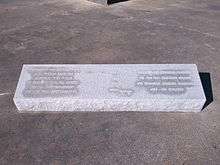German Texan
German Texan (German: Deutschtexaner) is both a term to describe immigrants who arrived in the Republic of Texas from Germany from the 1830s onward and an ethnic category that includes their descendants in today's state of Texas. The arriving Germans tended to cluster in ethnic enclaves; the majority settled in a broad, fragmented belt across the south-central part of the state, where many became farmers.[2] As of 1990, about three million Texans considered themselves at least part ethnic German,[3] a subgroup of German Americans.

| Part of a series on |
| Ethnicity in Texas |
|---|
|
|
|
History
Emigration in force began during the period of the Republic of Texas (1836–1846) following the establishment in 1842 of the Adelsverein (Verein zum Schutze deutscher Einwanderer, Society for the Protection of German Immigrants in Texas) by a group of Germans dedicated to colonizing Texas.[3]
The Adelsverein helped establish German colonies throughout the state, including purchasing the Fisher–Miller Land Grant, some 5000 square miles between the Colorado and Llano Rivers. In 1847, John O. Meusebach, acting as commissioner of the Adelsverein, negotiated the Meusebach–Comanche Treaty to settle German colonists on the land grant.[4] It remains the only unbroken treaty between European-American colonists and Native Americans.[5]
A large portion of the early settlers following statehood were Forty-Eighters, emigres from the Revolutions of 1848, who dispersed into areas of Central Texas.[6] After generations, German Texans spoke what became known as Texas German (German: Texasdeutsch), a German language dialect that was tied to the historic period of highest immigration. In Germany, the language developed differently from how it did among the relatively isolated ethnic colony in the US. The dialect has largely died out since the First and Second World Wars, as have many US German dialects.
After a period of ethnic activism during the 1850s, the Civil War, and Reconstruction, the Germans lived in relative obscurity as teachers, doctors, civil servants, politicians, musicians, farmers, and ranchers.[6] They founded the towns of Bulverde, New Braunfels, Fredericksburg, Boerne, and Comfort in Texas Hill Country, and Schulenburg, Walburg, and Weimar to the east.
German-American cultural institutions in Texas include the Sophienburg Museum in New Braunfels, the Pioneer Museum in Fredericksburg,[7] the Witte-Schmid Haus Museum in Austin County,[8] the German-Texan Heritage Society,[9] and the Texas German Society.[10]
See also
- List of German Texans
- Texas German
- History of Fredericksburg, Texas
- German immigration to Mexico
- German Palatines
- Pennsylvania Dutch
- History of Germany
References
- A 10K Walk Through German-Texas Heritage in Austin, Texas. The University of Texas at Austin. 3/6. Retrieved on November 15, 2009.
- Germans from the Handbook of Texas Online
- "William Eberling – German Texan". Texas State Cemetery. Retrieved 2013-06-02.
- TETZLAFF, OTTO W. (15 June 2010). "MEUSEBACH-COMANCHE TREATY". tshaonline.org. Retrieved 21 March 2018.
- DASSO, TIM (4 October 2016). "The Unbroken Peace Treaty". True West Magazine. Retrieved 21 March 2018.
- Forty-Eighters from the Handbook of Texas Online
- "German Texans: Curriculum for Students" (PDF). Retrieved 2013-06-02.
- "Witte-Schmid Haus Museum, "Das Haus"". Texas German Society. Archived from the original on 2013-02-02. Retrieved 2013-06-02.
- "GermanTexas.org – Promoting Awareness and Preservation of the German Cultural Heritage of Texas". www.germantexans.org.
- "Welcome to the Texas German Society Website". texasgermansociety.com.
Further reading
- Biesele, Rudolph Leopold, The History of the German Settlements in Texas: 1831–1861. 1930, 1964. Reprint, San Marcos: German-Texan Heritage Society, 1987.
- Jordan, Terry G. The German Settlement of Texas after 1865. Southwestern Historical Quarterly. Vol. 73, No. 2, Oct. 1969, pp. 193–212.
- Jordan, Terry G. German Seed in Texas Soil: Immigrant Farmers in Nineteenth-Century Texas. Austin: University of Texas Press, 1966, 1975, etc.
- Lich, Glen E. The German Texans. San Antonio: University of Texas at San Antonio Institute of Texan Cultures, 1981; revised, 1996.
- Lonn, Ella Foreigners in the Confederacy. First published in 1940, it remains the only work on the subject, republished February 2002
- The German Texans. San Antonio: University of Texas Institute of Texan Cultures at San Antonio, 1970, 1987. (Pamphlet in the "Texians and Texans" series)
External links
- German-Texan Heritage Society
- Texas German Society
- Wanderlust: From German to Texan, exhibit at the Witte Museum
- "German Texans: Curriculum for Students" (PDF).
- Germanic studies, University of Texas at Austin
- Austin Genealogical Society
- German Texan Families
- German immigration to Texas materials, hosted by the Portal to Texas History
- How Luckenbach, Texas Got Its Name
